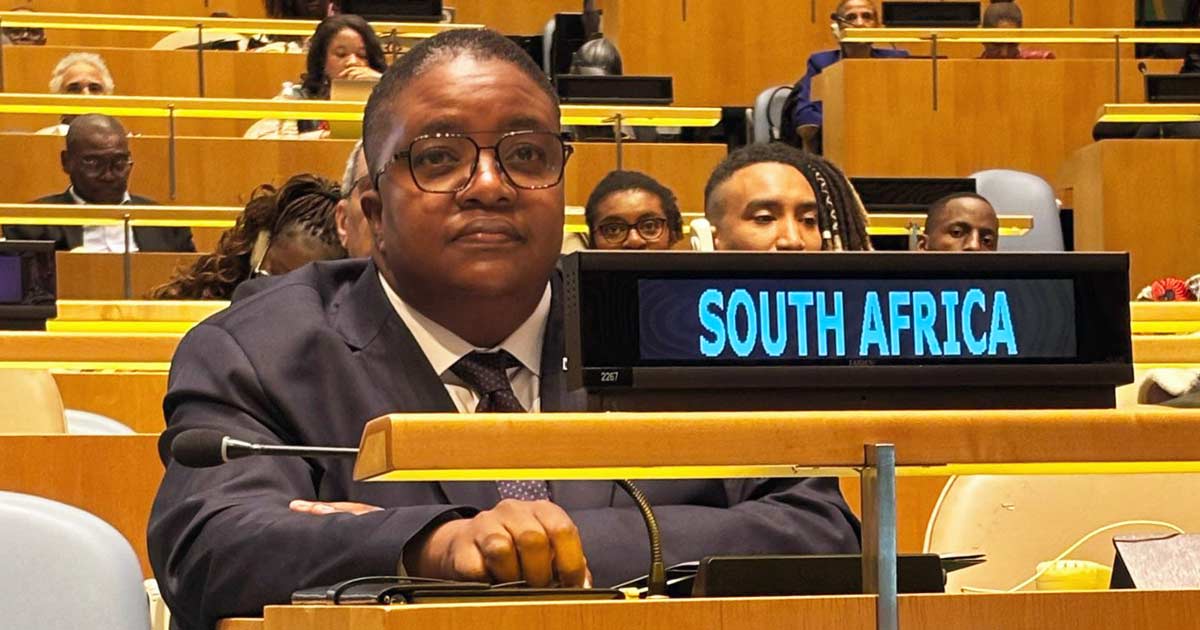South Africa’s Steve Letsike Makes Groundbreaking UN LGBTI Statement

South African Deputy Minister Steve Letsike at the United Nations
In a historic address at the United Nations in New York on Monday, South African Deputy Minister Steve Letsike highlighted the interconnected struggles faced by LGBTI individuals and people of African descent.
Letsike, who is the Deputy Minister of Women, Youth and Persons with Disabilities, delivered the powerful statement on behalf of the United Nations LGBTI Core Group at the fourth session of the Permanent Forum on People of African Descent (PFPAD), held at the UN Headquarters.
This marked the first time the UN LGBTI Core Group – an informal coalition of UN member states promoting LGBTI+ rights – has addressed the PFPAD. The forum serves as a consultative mechanism to improve the safety, well-being, and livelihoods of people of African descent and advises the UN Human Rights Council on related issues.
A Shared Struggle
Letsike’s landmark statement called for a united front in the fight for dignity, equality, and justice.
“Both LGBTI persons and people of African descent share a common struggle for dignity, equality, and justice in the face of systemic oppression, discrimination, and exclusion,” Letsike said. “Their experiences illuminate the necessity of combating racism and homophobia not in isolation, but as part of a unified effort toward equity and collective liberation.”
Letsike opened her address by honouring the legacy of the 1969 Stonewall uprising led by Marsha P Johnson and Sylvia Rivera – both people of African descent and icons of queer resistance. She powerfully linked the history of racial and queer oppression, underscoring the imperative of intersectional advocacy that recognises shared histories of resistance and resilience.
“The principle of the universality and indivisibility of all human rights extends from the understanding that all human beings are born free and equal in dignity and rights,” she asserted.
“The recognition of these rights includes the right to live free from violence, protection from discrimination and equality before the law, access to education and health care, participation in public life, and the freedom of opinion and expression that applies equally to all people, including LGBTI persons and people of African descent.”
The statement also issued a call to action, urging governments to adopt policies that tackle intersecting forms of discrimination and to move beyond symbolic gestures toward meaningful, inclusive change.
“Solidarity between and within these groups is not only morally imperative but strategically powerful,” Letsike stated. “By acknowledging their shared histories of resistance and resilience, we affirm that the struggle for justice is interconnected—and that true progress requires the empowerment of all marginalised people.”
A Proud Moment for Queer Africans
Queer civil society organisations, including the Embrace Diversity Movement (EDM) and Access Chapter 2 (AC2), lauded the moment as an important breakthrough in LGBTI+ representation at international human rights forums.
“This is a proud chapter in queer history – and more importantly, in African queer history,” said AC2, of which Letsike was a founder, in a statement. “Nothing about us without us. It was deeply meaningful that a queer African, specifically a Black South African, delivered this statement.”
EDM similarly praised Letsike’s address, calling it a “milestone in the recognition of the intersecting struggles faced by LGBTI individuals of African descent,” and highlighting South Africa’s continued global leadership in upholding human rights and inclusive democracy.
South Africa – the first country in the world to constitutionally prohibit discrimination based on sexual orientation – once again reaffirmed its progressive legacy on the global stage. And with Letsike’s voice, African queer leadership was not only present but powerfully front and centre.
As AC2 poignantly put it: “Let this be the beginning of deeper unity across movements and communities, especially for queer people of African descent.”
Leave a Reply